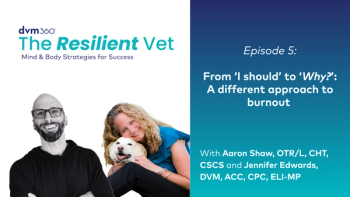
Florida veterinarian helps colleagues LOL
Veterinarian by day, cartoonist by night, Dean Scott, DVM, deals with stresses through humor at funnyvet.com.
Dean Scott, DVM, started drawing cartoons to stay awake during veterinary school. He sketched his way through what he refers to as a four-year sentence at University of California-Davis School of Veterinary Medicine and says he was released on his own recognizance in 1993. After serving (lunches and dinner, mainly) in the U.S. Army Veterinary Corps and becoming co-owner of Animal Clinic of Brandon in Brandon, Fla., Scott realized he had dozens of veterinary-related cartoons lying around collecting dust. "As a veterinarian all I could think was, 'How else can I not make money?'" Scott says.
And then he created
LOLdogs: Each cartoon goes through a rigorous approval process with the FunnyVet staff. Scott also has three cats-they donât find him funny.
"I hear about the high suicide rate of veterinarians and how much pressure we're under all the time," Scott says. "My goal is to provide some humor in my own small way. I really think there's a need for it."
More than 3,000 veterinarians and veterinary team members from across the map visit
Did you recently have a ridiculous exchange with a client or a hilarious experience with a patient? Send your cartoon ideas to Dean Scott, DVM, using the contact form at funnyvet.com-heâs always looking for inspiration.
"I have received more thanks and praise in six years for
Scott says updating the site has become therapy for him as well as his audience. He posts 10 to 25 new cartoons every month and will upload cartoon number 1,000 in October. "This site has grown beyond anything I dreamed it would be," he says.
He's created YouTube (funnyvetdotcom) and Facebook (
Scott was first inspired to deal with stress through humor in veterinary school. He noticed the classes and exams weren't difficult just for him—everyone was having a tough time. He went on to write From the Back Row: A List of Veterinary School Stresses as Viewed by a Study on Prozac (CattleDog Pub, 1999) and the sequel, Vet Med Spread (BookMasters Publishing, 2010). "It started out as a top 10 list of school stresses," Scott says. "Ten wasn't enough, so I made it a top 1,000 list."
Now, it's client questions and interactions that get his wheels turning. Scott never identifies the pet owners in his cartoons and so far only one new client has discovered funnyvet .com—and she still made an appointment, he says. Scott's currently finishing an ebook called The Incomplete Dog Book: Nothing You Ever Wanted to Know About Dogs. He says the profession is sometimes much too serious and veterinarians can lighten up a bit.
Scott says he admires well-known funny veterinarians such as Michael Obenski (Where did I go wrong? Full moon follies), Bo Brock (Stampede: What would the horse say?) and Robert Miller (a featured columnist in DVM's sister publication Veterinary Medicine), but as far as he's concerned, there can never be too much humor. Scott says stress is lessened when veterinarians band together and poke fun at daily challenges. "There's nothing better than getting people to laugh and appreciate the absurdity that happens our profession," Scott says.
Newsletter
From exam room tips to practice management insights, get trusted veterinary news delivered straight to your inbox—subscribe to dvm360.




